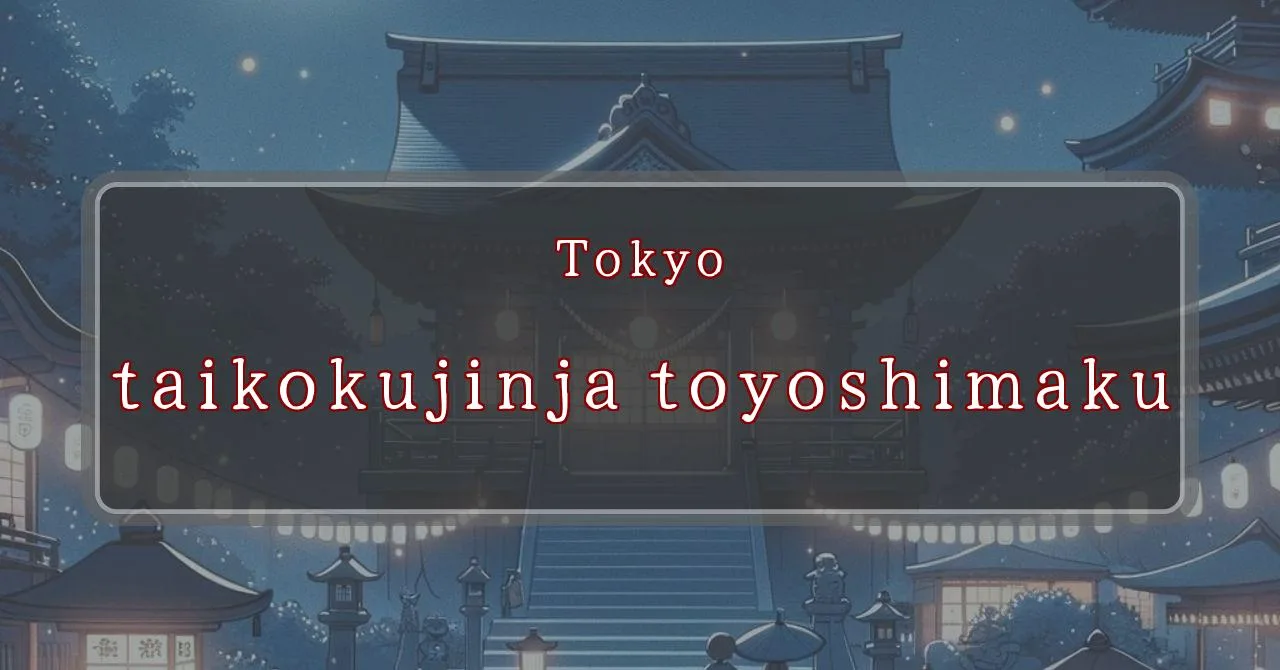Neon lights dance in Tokyo’s night sky
Basic Information
Daikoku Shrine is a Shinto shrine located in the Toshima district of Tokyo, Japan. It is dedicated to the deity Ōkuninushi, also known as Daikokuten, the god of wealth and prosperity.
- Address: 3-2-11 Komagome, Toshima-ku, Tokyo 170-0003
- Phone Number: 03-3918-7930
- Access: 1-minute walk from Komagome Station on the JR Yamanote Line or Tokyo Metro南北線
- Festival Days: May 10th (Sat), 2024 (Reiwa 6)
Main Events and Attractions of the Festival
The Daikoku Shrine Festival is an annual event that celebrates the deity Ōkuninushi, also known as Daikokuten, the god of wealth and prosperity. The festival features a variety of events and attractions, including:
Mikoshi Procession
A highlight of the festival is the mikoshi procession, where a portable shrine carrying the deity Ōkuninushi is paraded through the streets of Komagome. The procession is accompanied by music, dancing, and traditional Japanese costumes.
Kagura Performance
Kagura is a traditional Japanese Shinto dance and music performance that is often performed at festivals and shrines. During the Daikoku Shrine Festival, kagura performances are held in the shrine’s main hall.
Food and Market Stalls
The festival also features a variety of food and market stalls, where visitors can enjoy traditional Japanese festival foods such as takoyaki, yakisoba, and cotton candy. There are also stalls selling souvenirs and crafts.
Bon Odori Dance
In the evening, the festival concludes with a bon odori dance, a traditional Japanese folk dance that is often performed during Obon, the Japanese summer festival of the dead. Visitors are invited to join in the dance and celebrate the festival.
Blessings and Deities
Daikoku Shrine is dedicated to the deity Ōkuninushi, also known as Daikokuten, the god of wealth and prosperity. Ōkuninushi is a popular deity in Japanese mythology and is often depicted as a jolly man with a big belly and a sack of rice on his back. He is said to bring good luck, wealth, and prosperity to those who worship him.
Origin and History
The origins of Daikoku Shrine are unclear, but it is believed to have been founded in the early Edo period (1603-1868). The shrine was originally a small shrine located within the grounds of a private residence. In 1879, the shrine was moved to its current location and became an independent shrine.
Tips and Notes for Visitors
- The Daikoku Shrine Festival is held annually on May 10th. The festival features a variety of events and attractions, including a mikoshi procession, kagura performance, food and market stalls, and a bon odori dance.
- The shrine is open daily from 9:00 AM to 5:00 PM. Admission is free.
- The shrine is located a 1-minute walk from Komagome Station on the JR Yamanote Line or Tokyo Metro南北線.
- There is no parking lot at the shrine, but there are several coin-operated parking lots nearby.
Parking Information
There is no parking lot at Daikoku Shrine, but there are several coin-operated parking lots nearby. The closest parking lot is located a 2-minute walk from the shrine.
Popular Stalls and Food Carts in Recent Years
| Type of Stall | Description |
|---|---|
| Takoyaki | A staple at Japanese festivals. Characterized by a crispy outside and a creamy inside. |
| Jaga Butter | A simple yet popular snack of hot potatoes lavishly topped with melted butter. |
| Baby Castella | Small castella cakes, sweet and fluffy treats enjoyed by children and adults alike. |
| Grilled Ayu with Salt | Fresh ayu fish grilled whole with salt, a savory taste of Japanese summer. |
| Shaapin | A unique gourmet item influenced by foreign cuisine, with a chewy skin wrapping the filling. |
| Okonomiyaki | A Japanese grilled dish where you often choose your own ingredients for a personalized flavor. |
| Cotton Candy | A fluffy, sweet snack that’s extremely popular with children. |
| Chocolate Banana | A banana coated in chocolate, a fun and visually appealing dessert. |
| Kushiyaki | Various types of ingredients skewered and grilled, an easy-to-enjoy snack. |
| Yakisoba | Fried noodles mixed with a special sauce, a fast food favorite in Japan. |



